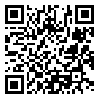Volume 15, Issue 2 (Summer 2023)
2023, 15(2): 40-49 |
Back to browse issues page
Ethics code: IR.IAU. BOJNOURD.REC.1398.001
Download citation:
BibTeX | RIS | EndNote | Medlars | ProCite | Reference Manager | RefWorks
Send citation to:



BibTeX | RIS | EndNote | Medlars | ProCite | Reference Manager | RefWorks
Send citation to:
Abedzadeh Yami M, Jajarmi M, Hojjat S K. Relationship between Behavioral-Brain Systems and Depression in Patients with MS Mediated by Cognitive Flexibility, Cognitive Avoidance, and Anxiety. North Khorasan University of Medical Sciences 2023; 15 (2) :40-49
URL: http://journal.nkums.ac.ir/article-1-2783-en.html
URL: http://journal.nkums.ac.ir/article-1-2783-en.html
1- Ph.D. Student in Psychology, Department of Counseling and Psychology, Zahedan Branch, Islamic Azad University, Zahedan, Iran
2- Assistant Professor, Department of Counseling and Psychology, Bojnourd Branch, Islamic Azad University, Bojnourd, Iran
3- Associate Professor,North Khorasan University of Medical Sciences, Bojnurd, Iran
2- Assistant Professor, Department of Counseling and Psychology, Bojnourd Branch, Islamic Azad University, Bojnourd, Iran
3- Associate Professor,North Khorasan University of Medical Sciences, Bojnurd, Iran
Abstract: (944 Views)
Introduction: This study aimed to investigate the depression of MS patients based on behavioral-brain systems mediated by cognitive flexibility, cognitive avoidance, and anxiety in the form of a causal model.
Method: The present study was a descriptive-correlational study using structural equation modeling. The statistical population included all MS patients in Mashhad, Iran. Considering 20 people for each parameter of the model, 300 people were selected according to the suggestion of Schuman, Bolton, and Short (2017), which increased to 350 people by the cluster random sampling method due to the possibility of dropout. Data were collected through standard tools: Beck depression (1972), Carver and White (1994) behavioral-brain system, cognitive flexibility of Dennis Wonderwall (2010), Sexton and Dougas (2004) cognitive avoidance, and Pennsylvania concern. The structural modeling method and AMOS software (version 21) were used to analyze the results.
Results: The results showed that the activating behavioral-brain system and cognitive flexibility had a negative and significant relationship with depression in MS cases. Moreover, the inhibitory behavioral-brain system, cognitive avoidance, and anxiety had a positive and significant relationship with depression. The standardized indirect effect of activating behavioral systems on depression was also significant, and the inhibitory system had a significant indirect effect on cognitive flexibility, cognitive avoidance, and anxiety. The activating behavioral system can negatively predict depression, and the inhibitory behavioral system can positively predict depression.
Conclusion: According to the findings, behavioral-brain systems can predict 0.36 of depressive changes in MS patients due to cognitive flexibility, cognitive avoidance, and anxiety.
Method: The present study was a descriptive-correlational study using structural equation modeling. The statistical population included all MS patients in Mashhad, Iran. Considering 20 people for each parameter of the model, 300 people were selected according to the suggestion of Schuman, Bolton, and Short (2017), which increased to 350 people by the cluster random sampling method due to the possibility of dropout. Data were collected through standard tools: Beck depression (1972), Carver and White (1994) behavioral-brain system, cognitive flexibility of Dennis Wonderwall (2010), Sexton and Dougas (2004) cognitive avoidance, and Pennsylvania concern. The structural modeling method and AMOS software (version 21) were used to analyze the results.
Results: The results showed that the activating behavioral-brain system and cognitive flexibility had a negative and significant relationship with depression in MS cases. Moreover, the inhibitory behavioral-brain system, cognitive avoidance, and anxiety had a positive and significant relationship with depression. The standardized indirect effect of activating behavioral systems on depression was also significant, and the inhibitory system had a significant indirect effect on cognitive flexibility, cognitive avoidance, and anxiety. The activating behavioral system can negatively predict depression, and the inhibitory behavioral system can positively predict depression.
Conclusion: According to the findings, behavioral-brain systems can predict 0.36 of depressive changes in MS patients due to cognitive flexibility, cognitive avoidance, and anxiety.
Keywords: MS patients, Cognitive avoidance, Depression, Cognitive flexibility, Behavioral brain system, Anxiety
Type of Study: Orginal Research |
Subject:
Basic Sciences
Received: 2021/05/23 | Accepted: 2023/04/17 | Published: 2023/08/26
Received: 2021/05/23 | Accepted: 2023/04/17 | Published: 2023/08/26
| Rights and permissions | |
 |
This work is licensed under a Creative Commons Attribution-NonCommercial 4.0 International License. |






